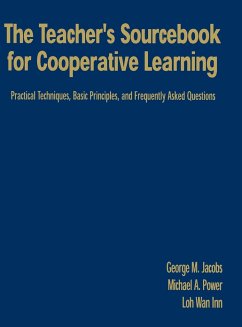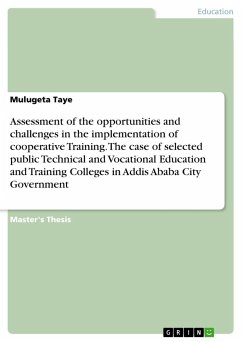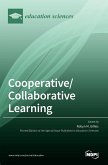George M. Jacobs, Michael A. Power, Loh Wan Inn
The Teacher's Sourcebook for Cooperative Learning
Practical Techniques, Basic Principles, and Frequently Asked Questions
George M. Jacobs, Michael A. Power, Loh Wan Inn
The Teacher's Sourcebook for Cooperative Learning
Practical Techniques, Basic Principles, and Frequently Asked Questions
- Gebundenes Buch
- Merkliste
- Auf die Merkliste
- Bewerten Bewerten
- Teilen
- Produkt teilen
- Produkterinnerung
- Produkterinnerung
A dynamic team of authors demonstrates how any classroom teacher can use cooperative learning techniques for lesson planning, classroom management, and improving students' collaboration skills.
Andere Kunden interessierten sich auch für
![The Effects of Cooperative Learning in a Medical Education Program The Effects of Cooperative Learning in a Medical Education Program]() Scott MasseyThe Effects of Cooperative Learning in a Medical Education Program38,99 €
Scott MasseyThe Effects of Cooperative Learning in a Medical Education Program38,99 €![Learning Peace: The Promise of Ecological and Cooperative Education Learning Peace: The Promise of Ecological and Cooperative Education]() Learning Peace: The Promise of Ecological and Cooperative Education107,99 €
Learning Peace: The Promise of Ecological and Cooperative Education107,99 €![Cooperative Problem-Solving Activities for Social Studies, Grades 6-12 Cooperative Problem-Solving Activities for Social Studies, Grades 6-12]() Michael HickmanCooperative Problem-Solving Activities for Social Studies, Grades 6-1289,99 €
Michael HickmanCooperative Problem-Solving Activities for Social Studies, Grades 6-1289,99 €![Assessment of the opportunities and challenges in the implementation of cooperative Training. The case of selected public Technical and Vocational Education and Training Colleges in Addis Ababa City Government Assessment of the opportunities and challenges in the implementation of cooperative Training. The case of selected public Technical and Vocational Education and Training Colleges in Addis Ababa City Government]() Mulugeta TayeAssessment of the opportunities and challenges in the implementation of cooperative Training. The case of selected public Technical and Vocational Education and Training Colleges in Addis Ababa City Government47,95 €
Mulugeta TayeAssessment of the opportunities and challenges in the implementation of cooperative Training. The case of selected public Technical and Vocational Education and Training Colleges in Addis Ababa City Government47,95 €![Reel Diversity Reel Diversity]() Brian C. JohnsonReel Diversity43,10 €
Brian C. JohnsonReel Diversity43,10 €![Cooperative/Collaborative Learning Cooperative/Collaborative Learning]() Cooperative/Collaborative Learning78,99 €
Cooperative/Collaborative Learning78,99 €![Cooperative Learning for Intercultural Classrooms Cooperative Learning for Intercultural Classrooms]() Kate Ferguson-PatrickCooperative Learning for Intercultural Classrooms202,99 €
Kate Ferguson-PatrickCooperative Learning for Intercultural Classrooms202,99 €-
-
-
A dynamic team of authors demonstrates how any classroom teacher can use cooperative learning techniques for lesson planning, classroom management, and improving students' collaboration skills.
Hinweis: Dieser Artikel kann nur an eine deutsche Lieferadresse ausgeliefert werden.
Hinweis: Dieser Artikel kann nur an eine deutsche Lieferadresse ausgeliefert werden.
Produktdetails
- Produktdetails
- Verlag: Corwin
- Seitenzahl: 186
- Erscheinungstermin: 1. August 2002
- Englisch
- Abmessung: 286mm x 221mm x 15mm
- Gewicht: 743g
- ISBN-13: 9780761946083
- ISBN-10: 076194608X
- Artikelnr.: 21521765
- Herstellerkennzeichnung
- Libri GmbH
- Europaallee 1
- 36244 Bad Hersfeld
- gpsr@libri.de
- Verlag: Corwin
- Seitenzahl: 186
- Erscheinungstermin: 1. August 2002
- Englisch
- Abmessung: 286mm x 221mm x 15mm
- Gewicht: 743g
- ISBN-13: 9780761946083
- ISBN-10: 076194608X
- Artikelnr.: 21521765
- Herstellerkennzeichnung
- Libri GmbH
- Europaallee 1
- 36244 Bad Hersfeld
- gpsr@libri.de
George M. Jacobs has a PhD in Educational Psychology from the University of Hawaii and a master's degree in Linguistics from the University of Illinois-Chicago. He has been teaching courses on cooperative learning since 1988. He has published many articles on the topic and is also a coauthor of Learning Cooperative Learning via Cooperative Learning: A Sourcebook of Lesson Plans for Teacher Education (1997). He is a member of the Executive Board of the International Association for the Study of Cooperation in Education and editor of its newsletter. He also specializes in second-language learning and helped compile an annotated bibliogra-phy of works on group activities in second-language instruction. Contact him at gmjacobs@ pacific.net.sg.
Introduction What Is Cooperative Learning? The Benefits of Cooperative Learning How to Get the Most From This Book About the Authors Part I: Getting Started With Cooperative Learning 1. Principle: Cooperation as a Value How can I get my class started using cooperative learning (CL)? What classroom management techniques might work well with CL? How might the room be arranged for CL? 2. Principle: Heterogeneous Grouping How can I form cooperative groups? How can I help my students work together smoothly? What are some strategies for team building? 3. Principle: Positive Interdependence What is positive interdependence? How can I help my students develop positive interdependence? How can we encourage an "all for one, one for all" spirit among students? 4. Principle: Individual Accountability How can I encourage all students to participate and learn? How can I help students learn to take responsibility for their group? 5. Principle: Simultaneous Interaction How can I give students lots of opportunities to express their ideas? Should students report on their group work to the whole class? How can I encourage students to explain their thinking to their group? 6. Principle: Equal Participation How can I promote equal participation in groups? How might CL help with differences in student ability levels? What about the students whose main strengths do not lie in academic skills? 7. Principle: Collaborative Skills Is it necessary to teach students how to cooperate? Can students learn collaborative skills while learning content, or does it have to be done separately? How might cooperative learning help students develop thinking skills? 8. Principle: Group Autonomy How can I help groups become more independent of the teacher? How much should I intervene when students are working in their CL groups? What is the teacher
s role when students have become more autonomous? 9. Assessment in Cooperative Learning How can I assess learning in cooperative groups? What are my options for grading students, and what are the pros and cons of giving all group members the same grade? How might I involve students in assessing themselves and each other? What about assessing how cooperative students are? Part II: Frequently Asked Questions About Cooperative Learning 10. Preparing Our Classes for Cooperative Learning What size should groups be? What if there is an uneven number of students? How long should CL groups stay together? What if students want to choose their own partners? How can CL work when students don
t believe they can learn from their peers? Should anything special be done when groups end? 11. Managing Cooperative Learning Classes Isn
t CL a recipe for behavioral chaos? Should I use time limits with group tasks? Won
t there be a lot of disruption and wasted time while students are moving into groups? How can I quickly get students
attention when they are working in groups? How do you deal with groups that are too noisy? What if some groups are not carrying out the task or activity properly? Is it a problem when groups finish at different times? How can group reporting be a learning experience for everyone in the class? How can I listen in as students are working together in their groups? 12. Creating CL Tasks How often should I use CL? How can I find the time necessary to prepare structured CL activities? How are CL lessons different from teacher-fronted lessons? Won
t group activities take too long? Won
t students complain about using the same CL technique, or even using CL, again and again? What if CL tasks are too difficult for students of different ability levels? 13. Enhancing Thinking When Using CL How can I encourage students working in groups to show creativity or other evidence of higher-order thinking? How can I ensure that group members avoid reaching quick consensus and have richer discussions? 14. Using CL in Special Situations How do I use CL with preschool and lower elementary school students? How do I use CL with students learning in a second language? How should we respond when students use their first language in CL groups using another language? How do I use CL with large classes? 15. Helping Groups That Aren
t Functioning Well What can I do when students don
t get along with their groupmates? My students argue with one another. How can I turn arguing into productive disagreement? What can I do about students who don
t participate much in CL activities? What about students who really want to work alone? What about students who dominate the group? What can I do when less able students hurt their group
s performance? What can I do when students give each other the wrong information? What can I do when there is cooperation within groups but not between groups? 16. Collaborating With Other Teachers Most other teachers at my school don
t seem interested in CL. Should I give up on them? A few other teachers I know are using CL. How can we help each other? What goals should my teacher support groups strive for? With what other changes in teaching does CL fit well? Why? 17. Working With Administrators and Parents How can I respond to administrators and parents who worry that CL won
t prepare students for multiple-choice tests such as the SAT? Will CL give me enough time to cover the syllabus and finish the textbook? How can I work with administrators who do not support CL? Part III: Resources for Cooperative Learning CL Print Resources Web Sites Index
s role when students have become more autonomous? 9. Assessment in Cooperative Learning How can I assess learning in cooperative groups? What are my options for grading students, and what are the pros and cons of giving all group members the same grade? How might I involve students in assessing themselves and each other? What about assessing how cooperative students are? Part II: Frequently Asked Questions About Cooperative Learning 10. Preparing Our Classes for Cooperative Learning What size should groups be? What if there is an uneven number of students? How long should CL groups stay together? What if students want to choose their own partners? How can CL work when students don
t believe they can learn from their peers? Should anything special be done when groups end? 11. Managing Cooperative Learning Classes Isn
t CL a recipe for behavioral chaos? Should I use time limits with group tasks? Won
t there be a lot of disruption and wasted time while students are moving into groups? How can I quickly get students
attention when they are working in groups? How do you deal with groups that are too noisy? What if some groups are not carrying out the task or activity properly? Is it a problem when groups finish at different times? How can group reporting be a learning experience for everyone in the class? How can I listen in as students are working together in their groups? 12. Creating CL Tasks How often should I use CL? How can I find the time necessary to prepare structured CL activities? How are CL lessons different from teacher-fronted lessons? Won
t group activities take too long? Won
t students complain about using the same CL technique, or even using CL, again and again? What if CL tasks are too difficult for students of different ability levels? 13. Enhancing Thinking When Using CL How can I encourage students working in groups to show creativity or other evidence of higher-order thinking? How can I ensure that group members avoid reaching quick consensus and have richer discussions? 14. Using CL in Special Situations How do I use CL with preschool and lower elementary school students? How do I use CL with students learning in a second language? How should we respond when students use their first language in CL groups using another language? How do I use CL with large classes? 15. Helping Groups That Aren
t Functioning Well What can I do when students don
t get along with their groupmates? My students argue with one another. How can I turn arguing into productive disagreement? What can I do about students who don
t participate much in CL activities? What about students who really want to work alone? What about students who dominate the group? What can I do when less able students hurt their group
s performance? What can I do when students give each other the wrong information? What can I do when there is cooperation within groups but not between groups? 16. Collaborating With Other Teachers Most other teachers at my school don
t seem interested in CL. Should I give up on them? A few other teachers I know are using CL. How can we help each other? What goals should my teacher support groups strive for? With what other changes in teaching does CL fit well? Why? 17. Working With Administrators and Parents How can I respond to administrators and parents who worry that CL won
t prepare students for multiple-choice tests such as the SAT? Will CL give me enough time to cover the syllabus and finish the textbook? How can I work with administrators who do not support CL? Part III: Resources for Cooperative Learning CL Print Resources Web Sites Index
Introduction What Is Cooperative Learning? The Benefits of Cooperative Learning How to Get the Most From This Book About the Authors Part I: Getting Started With Cooperative Learning 1. Principle: Cooperation as a Value How can I get my class started using cooperative learning (CL)? What classroom management techniques might work well with CL? How might the room be arranged for CL? 2. Principle: Heterogeneous Grouping How can I form cooperative groups? How can I help my students work together smoothly? What are some strategies for team building? 3. Principle: Positive Interdependence What is positive interdependence? How can I help my students develop positive interdependence? How can we encourage an "all for one, one for all" spirit among students? 4. Principle: Individual Accountability How can I encourage all students to participate and learn? How can I help students learn to take responsibility for their group? 5. Principle: Simultaneous Interaction How can I give students lots of opportunities to express their ideas? Should students report on their group work to the whole class? How can I encourage students to explain their thinking to their group? 6. Principle: Equal Participation How can I promote equal participation in groups? How might CL help with differences in student ability levels? What about the students whose main strengths do not lie in academic skills? 7. Principle: Collaborative Skills Is it necessary to teach students how to cooperate? Can students learn collaborative skills while learning content, or does it have to be done separately? How might cooperative learning help students develop thinking skills? 8. Principle: Group Autonomy How can I help groups become more independent of the teacher? How much should I intervene when students are working in their CL groups? What is the teacher
s role when students have become more autonomous? 9. Assessment in Cooperative Learning How can I assess learning in cooperative groups? What are my options for grading students, and what are the pros and cons of giving all group members the same grade? How might I involve students in assessing themselves and each other? What about assessing how cooperative students are? Part II: Frequently Asked Questions About Cooperative Learning 10. Preparing Our Classes for Cooperative Learning What size should groups be? What if there is an uneven number of students? How long should CL groups stay together? What if students want to choose their own partners? How can CL work when students don
t believe they can learn from their peers? Should anything special be done when groups end? 11. Managing Cooperative Learning Classes Isn
t CL a recipe for behavioral chaos? Should I use time limits with group tasks? Won
t there be a lot of disruption and wasted time while students are moving into groups? How can I quickly get students
attention when they are working in groups? How do you deal with groups that are too noisy? What if some groups are not carrying out the task or activity properly? Is it a problem when groups finish at different times? How can group reporting be a learning experience for everyone in the class? How can I listen in as students are working together in their groups? 12. Creating CL Tasks How often should I use CL? How can I find the time necessary to prepare structured CL activities? How are CL lessons different from teacher-fronted lessons? Won
t group activities take too long? Won
t students complain about using the same CL technique, or even using CL, again and again? What if CL tasks are too difficult for students of different ability levels? 13. Enhancing Thinking When Using CL How can I encourage students working in groups to show creativity or other evidence of higher-order thinking? How can I ensure that group members avoid reaching quick consensus and have richer discussions? 14. Using CL in Special Situations How do I use CL with preschool and lower elementary school students? How do I use CL with students learning in a second language? How should we respond when students use their first language in CL groups using another language? How do I use CL with large classes? 15. Helping Groups That Aren
t Functioning Well What can I do when students don
t get along with their groupmates? My students argue with one another. How can I turn arguing into productive disagreement? What can I do about students who don
t participate much in CL activities? What about students who really want to work alone? What about students who dominate the group? What can I do when less able students hurt their group
s performance? What can I do when students give each other the wrong information? What can I do when there is cooperation within groups but not between groups? 16. Collaborating With Other Teachers Most other teachers at my school don
t seem interested in CL. Should I give up on them? A few other teachers I know are using CL. How can we help each other? What goals should my teacher support groups strive for? With what other changes in teaching does CL fit well? Why? 17. Working With Administrators and Parents How can I respond to administrators and parents who worry that CL won
t prepare students for multiple-choice tests such as the SAT? Will CL give me enough time to cover the syllabus and finish the textbook? How can I work with administrators who do not support CL? Part III: Resources for Cooperative Learning CL Print Resources Web Sites Index
s role when students have become more autonomous? 9. Assessment in Cooperative Learning How can I assess learning in cooperative groups? What are my options for grading students, and what are the pros and cons of giving all group members the same grade? How might I involve students in assessing themselves and each other? What about assessing how cooperative students are? Part II: Frequently Asked Questions About Cooperative Learning 10. Preparing Our Classes for Cooperative Learning What size should groups be? What if there is an uneven number of students? How long should CL groups stay together? What if students want to choose their own partners? How can CL work when students don
t believe they can learn from their peers? Should anything special be done when groups end? 11. Managing Cooperative Learning Classes Isn
t CL a recipe for behavioral chaos? Should I use time limits with group tasks? Won
t there be a lot of disruption and wasted time while students are moving into groups? How can I quickly get students
attention when they are working in groups? How do you deal with groups that are too noisy? What if some groups are not carrying out the task or activity properly? Is it a problem when groups finish at different times? How can group reporting be a learning experience for everyone in the class? How can I listen in as students are working together in their groups? 12. Creating CL Tasks How often should I use CL? How can I find the time necessary to prepare structured CL activities? How are CL lessons different from teacher-fronted lessons? Won
t group activities take too long? Won
t students complain about using the same CL technique, or even using CL, again and again? What if CL tasks are too difficult for students of different ability levels? 13. Enhancing Thinking When Using CL How can I encourage students working in groups to show creativity or other evidence of higher-order thinking? How can I ensure that group members avoid reaching quick consensus and have richer discussions? 14. Using CL in Special Situations How do I use CL with preschool and lower elementary school students? How do I use CL with students learning in a second language? How should we respond when students use their first language in CL groups using another language? How do I use CL with large classes? 15. Helping Groups That Aren
t Functioning Well What can I do when students don
t get along with their groupmates? My students argue with one another. How can I turn arguing into productive disagreement? What can I do about students who don
t participate much in CL activities? What about students who really want to work alone? What about students who dominate the group? What can I do when less able students hurt their group
s performance? What can I do when students give each other the wrong information? What can I do when there is cooperation within groups but not between groups? 16. Collaborating With Other Teachers Most other teachers at my school don
t seem interested in CL. Should I give up on them? A few other teachers I know are using CL. How can we help each other? What goals should my teacher support groups strive for? With what other changes in teaching does CL fit well? Why? 17. Working With Administrators and Parents How can I respond to administrators and parents who worry that CL won
t prepare students for multiple-choice tests such as the SAT? Will CL give me enough time to cover the syllabus and finish the textbook? How can I work with administrators who do not support CL? Part III: Resources for Cooperative Learning CL Print Resources Web Sites Index








